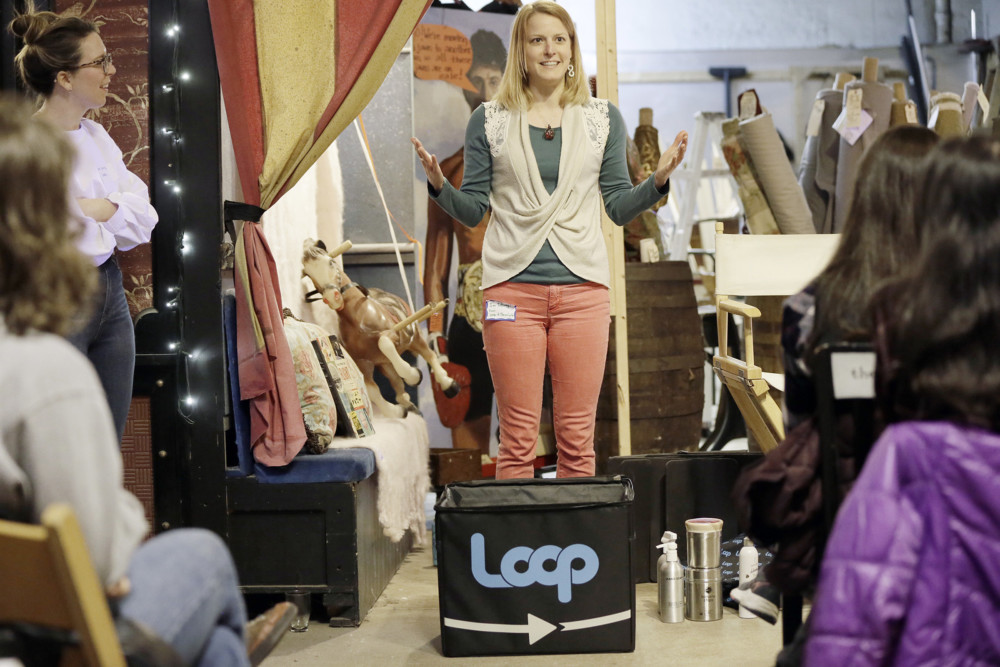By Grace Dickinson
The Philadelphia Inquirer
WWR Article Summary (tl;dr) Women business owners in Philadelphia are joining forces to find the best ways to create a more sustainable local economy.
The Philadelphia Inquirer
On a recent Wednesday evening, nine entrepreneurs, from glass blowers to composters to kombucha makers, gathered at the Resource Exchange in Kensington to address a crowd of mostly 20- and 30-something women sipping mixed drinks through biodegradable paper revolved around the circular economy, a system that aims to minimize waste through reduction, reuse, and recycling of materials.
“Glass is perfect,” declared Rebecca Davies of Remark Glass. “It’s reusable, it doesn’t leach chemicals into food or the environment, it’s recyclable … and it can store an entire bottle of wine. What more could you want?”
Davies passed around a small bowl, an example of her studio’s handiwork, made by melting down recycled beer, wine, and liquor bottles, then reshaping the material into glassware, light fixtures, and other home decor.
Over the next hour or so, Davies and the other business owners chatted about ways to create a more sustainable local economy. During a Q&A session at the end, a half-dozen audience members’ hands eagerly shot up.
“Do you think Philadelphia will ever create a citywide municipality composting program?” asked one. “How is the current global sand shortage affecting glass supply?” inquired another.
The event and its panel were curated by Women for a Sustainable Philadelphia, a group founded in 2013 that connects sustainability professionals and green-minded consumers both in person and online. Though the group was started by women, its events and Facebook community are open to all genders and identities.
“We’re just looking to join together people who are really passionate, energetic, and supportive in this space,” said Catherine Kendig, 34, a cofounder of the group and an adviser at Tesla. “People meet here and often realize that they’re trying to tackle similar issues but in entirely different fields, which sparks opportunities for collaboration and problem-solving.”
Beyond environmental entrepreneurs, Women for a Sustainable Philadelphia is open to anyone who wants to lead a greener lifestyle. The handful of events held each year provides the group’s industry professionals and sustainability-minded members to coalesce around the cause.
“I’d always talk nonstop about sustainability topics with my friends, and sometimes they’d tune me out, it’s just not what they’re thinking about all day,” said Jen Singley, 27, who launched the group’s event component in May.
“Through this group, I’ve met so many people I wouldn’t have met otherwise, people like me who walk by a trash can and can’t help but stop to pull out the recyclables.”
Leah Tanner, 22, a sample coordinator at Free People, went to the recent circular economy discussion to meet other people interested in leading zero-waste lifestyles. “But I ended up learning about so many resources in the area. I’m actually planning to sign up for Bennett Compost tonight,” she said.
That kind of feedback is part of why the group started holding these functions. “The events are designed to be a platform for business leaders to introduce real, tangible resources to residents in the area,” said Kendig.
Discussion topics have included clean water, storm-water management, and a dive into the details of Philadelphia’s Zero Waste Initiative. Audience members usually leave with a variety of ideas they can put to use in their own lives, like installing a rain garden.
Besides composting and glass recycling, attendees of the circular economy gathering were introduced to concepts like Loop, an initiative from recycling company TerraCycle. The subscription home-delivery service partners with mainstream companies, like Haagen-Dazs, to replace single-use packaging with reusable products, such as double-walled steel pint containers.
Some of the environmental entrepreneurs presented customer reward programs. At Inspired Brews, customers can earn 25 cents for every empty kombucha bottle returned. The bottles are sanitized and reused.
The events generally draw from 20 to 60 participants, and the group’s Facebook membership currently numbers about 450. Almost daily, members post invites to other networking events, articles about topics like recycling, and internship and professional opportunities in the industry.
“So many of the women that come here are natural movers and shakers in the sustainable-business world,” said Kelly Offner, 29, who has attended four of the group’s events. “There’s a sense of excitement and camaraderie when you walk into the room, and you always find women asking really bold questions.”
For Davies, the women-focused aspect of the group is particularly appealing.
“Women in business tend to be supportive and collaborative, and when those two attributes come together, we can really start the conversation of where we’re going to bring the economy into the future,” Davies said. “This is a group of problem-solvers who are invested in how we’re going to grow the city in a positive direction.”














































































































































































































































































































































































